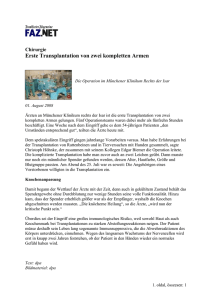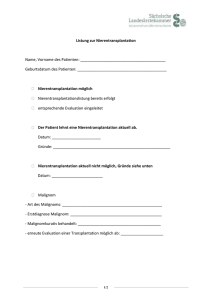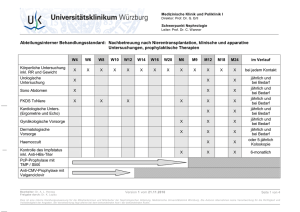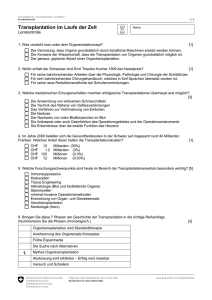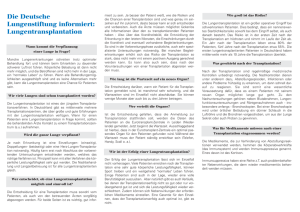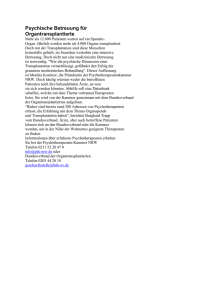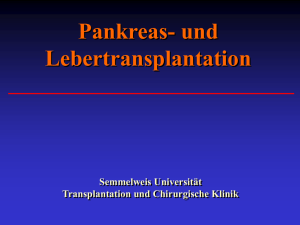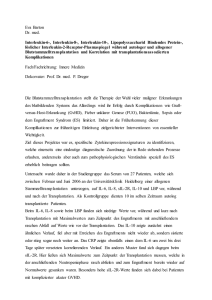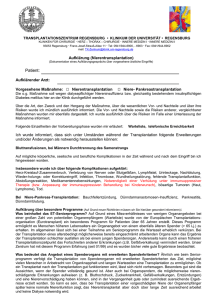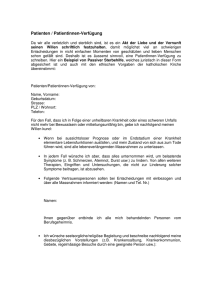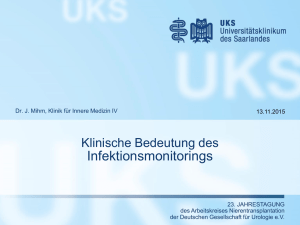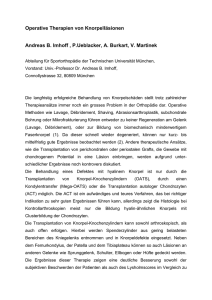selected topics you should know November 4th – 5th, 2016
Werbung
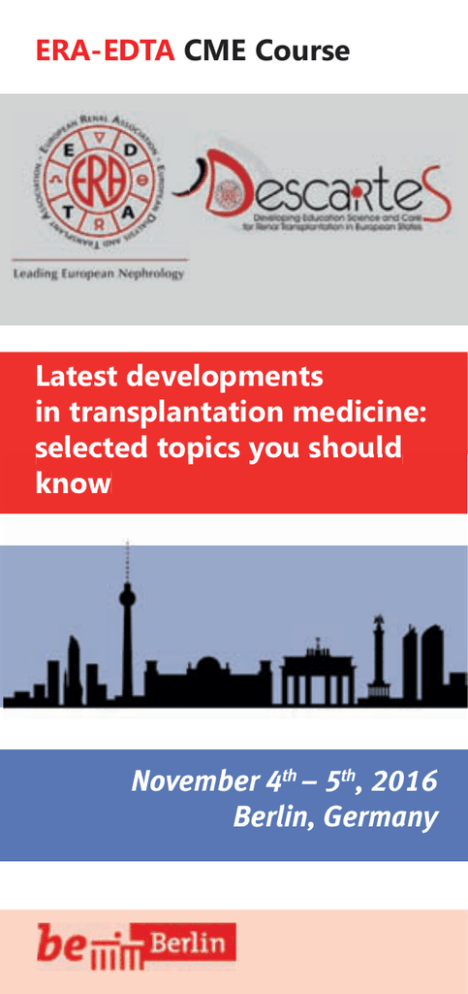
ERA-EDTA CME Course Latest developments in transplantation medicine: selected topics you should know November 4th – 5th, 2016 Berlin, Germany For at-risk patients in renal transplant This gift is too precious to lose When there’s risk of acute rejection, reduce it with Thymoglobuline Thymoglobuline® 5 mg / ml Pulver zur Herstellung einer Infusionslsg. Wirkstoff: Anti-Human Thymozyten-Immunglobulin vom Kaninchen. Zusammens.: Arzneil. wirks. Bestandt.: Nach Rekonst. mit 5 ml Wasser f. Inj.-zw. enth. die Lsg. 5 mg Kaninchen-ATG / ml. Sonst. Bestandt.: Glycin, Mannitol, Natriumchlorid. Anw.-geb.: Prophylaxe v. Abstoßungsepisoden nach Transplantationen v. Niere, Herz, Leber u. Pankreas (üblicherweise in Komb. m. and. Immunsuppressiva); Ther. v. Abstoßungsepisoden nach Transplantationen v. Niere, Herz u. Leber; Ther. d. aplast. Anämie, wenn and. Ther. versagen. Gegenanz.: akute od. chron. Infekte, d. e. zusätzl. Immunsuppress. entgegenstehen würden. Überempfdlk. ggü. Kaninchenprot. od. e. d. sonst. Bestandt. Warnhinw.: Nur stationär verabreich. B. Auftreten v. schwerwieg. immunvermitt. Rkt. wie Anaphylaxie od. Zytokin-Freisetz.-Syndr. Inf. sofort beenden. Notfallmaßn. einleiten. Sorgf. Abwägung weiterer Ther. b. Pat. mit Anamnese f. anaphylakt. Rkt. gg. Thymoglobuline. Vorsicht b. Vorliegen v. Thrombozyto- u. / od. Leukopenie. Bes. Vorsicht Lebererkrankungen, da sich vorbestehende Gerinnungsstörungen verschlimmern können. Sorgf. Überwach. d. Thrombozyten und Gerinnungsparameter empf. Thrombozytopenie u. / o. Leukopenie mögl. Nach Dosisanpassung reversibel. Werte überwachen. Ggf. Reaktivierung v. Infekt. b. Komb.-gabe m. and. Immunsuppressiva (Infektionsprophylaxe) Erhöhtes Risiko f. Krebserkr. inkl. Lymphomen. Schwere akute infusionsbed. Rkt. mögl., u. U. m. schwerwiegenden kardioresp. Ereignissen. Schwangersch. u. Stillzeit: Anw. während Schwangersch. nur b. strenger Indikationsstellung. Während d. Anw. darf nicht gestillt werden. Wechselw.: and. Immunsuppressiva: Risiko e. zu starken Immunsuppress. m. mögl. Lymphosuppress. Keine gleichz. Verabr. v. Blut od. Blutderivaten. Impf. m. abgeschw. Lebendvakzinen b. Pat., d. kürzlich m. Thymoglobuline behand. wurden nicht empf. Bei Impf. m. inaktivierten Impfst. evtl. Ausbleiben d. Wirkung, Antikörperspiegel nach ca. 4 Wo. kontroll. Nebenw.: Blut u. Lymphsyst.: Sehr häufig Lympho-, Neutro- u. Thrombozytopenie. Häifig febrile Neutropenie. Atemw., Brustraum u. Mediast.: Häufig Dyspnoe. GIT: Häufig Diarrhoe, Dysphagie, Übelkeit, Erbrechen. Leber / Galle: Häufig erhöhte Transaminasen. Gelegentlich hepatozelluläre Schädigung, Lebertoxizität, Leberversagen. Haut u. Unterhautzellgew.: Häufig Pruritus, Exanthem. Skelettmskl., Bindegew. u. Knochen: Häufig Myalgie. Infekt. u. parasit. Erkr.: Sehr häufig Infekt. Gutartige, bösartige u. unspezifische Neubildungen (einschl. Zysten und Polypen): Häufig: Malignom, Lymphome (möglicherweise viral vermittelt), bösartige Neubildungen (solide Tumore). Gelegentlich lymphoproliferative Erkrankung. Gefäße: Häufig Hypotonie. Allg. Erkr.: Sehr häufig Fieber. Häufig Schüttelfrost. Gelegentlich: Reaktionen im Zusammenhang mit einer Infusion (infusionsbedingte Reaktionen [IARs]). Immunsyst.: Gelegentlich Serumkrankheit, Zytokinfreisetzungssyndrom (CRS), anaphylaktische Reaktion. Hinweis: Nicht empf. ist d. Komb. v. Thymoglobulinen, Heparin u. Hydrocortison in einer Glucose-Infusionslsg. Führt zur Ausfällung. Verschreibungspflichtig. Pharmazeutischer Unternehmer: Genzyme Europe B. V., Gooimeer 10, 1411 DD Naarden, Niederlande. Stand: November 2015 (SADE.THYM.16.01.0117). SADE.THYM.16.06.1730 1601_TGB_A Mit wegweisenden Therapien komplexen Erkrankungen begegnen. Table of Contents Page General Information 2 Board Members Organiser Organising Secretariat Certification General Information 4 Congress Venue Location & Direction Welcome 5 Scientific Program, November 4th, 2016 6 Scientific Program, November 4 & 5 , 2016 8 Addresses of speakers 9 th th Sponsors 10 Registration and abstract submission Participation fees 11 Imprint 12 1 General Information Board Members Daniel Abramowicz (Belgium) – Chairman Umberto Maggiore (Italy) – Secretary Klemens Budde (Germany) Uwe Heemann (Germany) Luuk Hilbrands (The Netherlands) Rainer Oberbauer (Austria) Julio Pascual (Spain) Gabriel Oniscu (United Kingdom) Søren Schwartz Søresen (Denmark) Ondřej Viklický (Czech Republic) Organiser Prof. Klemens Budde Charité – Universitätsmedizin Berlin Medizinische Klinik mit Schwerpunkt Nephrologie Berlin (Germany) Organising Secretariat Aey Congresse GmbH Seumestr. 8 10245 Berlin (Germany) Tel: +49 (0) 30 2900659-4 Fax: +49 (0) 30 2900659-5 email: [email protected] descartes.aey-congresse.de Certified by Ärztekammer Berlin 6 CME points Category C 2 U.E.M.S. accreditation Bei atypischem HUS, komplement-vermittelte thrombotische Mikroangiopathie TMA hemmen mit Soliris ® ZUGELASSEN FÜR ERWACHSENE, KINDER UND JUGENDLICHE MIT aHUS Soliris® (Eculizumab) ist indiziert zur Behandlung von Patienten mit atypischem Hämolytisch-Urämischen Syndrom (aHUS).1 Soliris® 300 mg Konzentrat zur Herstellung einer Infusionslösung. Wirkstoff: Eculizumab. Wirkstoffgruppe Selektive Immunsuppressiva, ATC-Code: L04AA25. Zusammensetzung: Arzneilich wirksame Bestandteile: Eine Durchstechflasche mit 30 ml enthält 300 mg Eculizumab (10 mg/ml). Sonstige Bestandteile: Natriumphosphat monobasisch, Natriumphosphat dibasisch, Natriumchlorid, Polysorbat 80, Wasser für Injektionszwecke. Anwendungsgebiet: Behandlung von Erwachsenen, Kindern und Jugendlichen mit Paroxysmaler Nächtlicher Hämoglobinurie (PNH), atypischem Hämolytisch-Urämischen Syndrom (aHUS). Gegenanzeigen: Überempfindlichkeit gegen Eculizumab, murine Proteine oder sonstige Bestandteile. Nicht ausgeheilte Infektion mit Neisseria meningitidis. Fehlender aktueller Impfschutz gegen Neisseria meningitidis (es sei denn, die Patienten erhalten eine geeignete Antibiotikaprophylaxe bis zwei Wochen nach der Impfung). Nebenwirkungen: Sehr häufig (≥ 1/10): Kopfschmerzen, Häufig (≥ 1/100,< 1/10): Meningokokken-Sepsis, Aspergillus-Infektion, bakterielle Arthritis, Infektion der oberen Atemwege, Nasopharyngitis, Bronchitis, Herpesinfektion (oral), Harnwegsinfektion, Virusinfektion, Thrombozytopenie, Leukopenie, Hämolyse, anaphylaktische Reaktion, Appetitverlust, Schwindelgefühl, Dysgeusie, Hypotonie, Atemnot, Husten, verstopfte Nase, Pharynx-, Larynxschmerzen, Rhinorrhoe, Diarrhoe, Erbrechen, Übelkeit, Bauchschmerzen, Obstipation, Dyspepsie, Hautausschlag, Alopezie, Pruritus, Arthralgie, Myalgie, Muskelkrämpfe, Knochenschmerzen, Rückenschmerzen, Nackenschmerzen, Schmerzen in Extremitäten, Ödeme, Thorax-Beschwerden, Fieber, Schüttelfrost, Fatigue, Asthenie, grippeähnliche Erkrankung, Coombs-Test positiv. Gelegentlich (≥ 1/1000, < 1/100): Meningokokken-Meningitis, Neisseria-Infektion, Sepsis, septischer Schock, Pneumonie, Infektion der unteren Atemwege, Pilzinfektion, Haemophilus influenzae-Infektion, Abszess, Zellulitis, Influenza, gastrointestinale Infektion, Zystitis, Zahnfleischentzündung, Infektion, Sinusitis, Zahnentzündung, Impetigo, Malignes Melanom, Myelodysplastisches Syndrom, Koagulopathie, Erythrozyten-Agglutination, abnormer Gerinnungsfaktor, Anämie, Lymphopenie, Hypersensitivität, Morbus Basedow, Anorexie, Depression, Angst, Insomnie, Schlafstörungen, Alpträume, Stimmungsschwankungen, Synkopen, Tremor, Parästhesie, verschwommenes Sehen, Bindehautreizung, Tinnitus, Vertigo, Palpitation, progressive Hypertonie, Hypertonie, Hämatom, Hitzewallungen, Venenerkrankung, Nasenbluten, Rachenreizung, Peritonitis, gastro-ösophagealer Reflux, abdominales Spannungsgefühl, Schmerzen des Zahnfleisches, Ikterus, Urtikaria, Dermatitis, Erythem, Petechien, Pigmentstörung der Haut, trockene Haut, Hyperhidrose, Trismus, Gelenkschwellung, Nierenschädigung, Hämaturie, Dysurie, Spontanerektion, Menstruationsbeschwerden, Schmerze n im Brustraum, Parästhesie an der Infusionsstelle, Schmerz an der Infusionsstelle, Extravasat, Wärmegefühl, Alanin-Aminotransferase erhöht, Aspartat-Aminotransferase erhöht, γ-Glutamyltransferase erhöht, Hämatokrit erniedrigt, Hämoglobin erniedrigt, infusionsbedingte Reaktion. Warnhinweise und Vorsichtsmaßnahmen für die Anwendung, Wechselwirkungen mit anderen Arzneimitteln oder sonstige Wechselwirkungen: Siehe veröffentlichte Fachinformation. Schwangerschaft/Stillzeit: Während der Schwangerschaft nicht empfohlen. Während der Behandlung nicht stillen. Weitere Informationen in der veröffentlichten Fachinformation. Verschreibungspflichtig. Rezept-/Apothekenpflichtig. Zulassungsinhaber: Alexion Europe SAS, 1-15, avenue Edouard Belin, 92500 Rueil-Malmaison, Frankreich. Örtlicher Vertreter: Deutschland/Österreich: Alexion Pharma Germany GmbH, Arnulfstr. 19, 80335 München. Stand der Information: September 2015 Referenzen: 1 Soliris® (Eculizumab) Fachinformation DE/AT/SOL-aHUS/16/0040 3 General Information Congress Venue November 4th, 2016 InterCityHotel Berlin Hauptbahnhof Katharina-Paulus-Straße 5 10557 Berlin Germany Dinner Restaurant „Zollpackhof“ Elisabeth-Abegg-Str. 1 10557 Berlin November 5th, 2016 Ward round Charité – Universitätsklinikum Berlin, Campus Berlin Mitte At 08.45am (first group) and at 10.15am (second group) participants are picked up from InterCityHotel. Location & Direction InterCityHotel Berlin Hauptbahnhof Right on the doorstep to the main train station, the InterCityHotel Berlin Hauptbahnhof is just a few short steps away from the city and everything it has to offer in terms of shopping and entertainment. Berlin‘s hotspots are easy to reach on foot: Federal Chancellery (approx. 6 minutes), Brandenburg Gate (approx. 20 minutes), Potsdamer Platz (approx. 30 minutes). FreeCityTicket In all InterCityHotels a FreeCityTicket is included. This enables guests to use all of the local public transport free of charge. Airport Berlin Tegel (Distance: 7.5 km) Estimated taxi fare: € 15 (one way) Train Berlin Hauptbahnhof (Distance: 0.1 km) 4 Welcome Dear colleagues, transplantation medicine is moving fast and with our busy schedules, we all experience difficulties to keep up to date. In order to address this dilemma the DESCARTES working group on renal transplantation cordially invites you to come to Berlin and participate in a comprehensive 1 day CME course on the latest developments in transplantation. The course will cover a broad range of hot topics: from actual trends in stem cell research and basic science to latest treatment options for transplanted patients. We will discuss current therapeutic concepts in a variety of challenging patient groups such as obese or pregnant patients. State of the art lectures cover actual therapeutic concepts for difficult to treat patients including patients with FSGS, Hepatitis C, multi-drug resistant bacteria or poor kidney function. A lecture on novel tools to detect nonadherence will enable the participant to better understand this important barrier to long-term success. The course will also provide new insights into allocation and scoring systems and will give an extensive overview on the risks associated with living kidney donation. For the first time, we are planning ward rounds for 24 young delegates on November 5th. The delegates will visit transplanted patients with experienced transplant nephrologists in small groups at the nearby Charité University Hospital. The DESCARTES group encourages the audience to submit abstracts on hot topics in renal transplantation (max. 500 words). The three best scored abstracts will be presented during the meeting and awarded with a grant of 1000€, 500€, 250€ in addition to free accommodation and travel. Abstract submission deadline will be October 1st 2016. Personally I am looking forward to a fantastic educational activity in the heart of Europe. I hope that you are able to come to the vibrant city of Berlin for this outstanding event and join transplant specialists from all across Europe to discuss the latest developments in transplantation medicine with European key opinion leaders. See you in Berlin Klemens Budde 5 Program – November 4th, 2016 8.45-9.00 Opening Ceremony Daniel Abramowicz, Descartes Chairman Klemens Budde, Germany Session 1 9.00-9.40 Stem cells: ready to enter in the clinical arena? Ton Rabelink, The Netherlands 9.45-10.25 Basic science for dummies: what should you know? Alain Le Moine, Belgium 10.30-10.55 How to manage patients with FSGS at transplantation? Guillaume Canaud, France 11.00-11.30 Coffee Break Session 2 11.30-11.55 Comparisons between various allocation systems. Uwe Heemann, Germany 12.00-12.25 Kidney transplantation for obese dialysis patients. Gabriel Oniscu, UK 12.30-13.15 Usefulness of scoring systems for assessing suitability to receive a kidney transplant: PRO, Rainer Oberbauer, Austria CON, Klemens Budde, Germany 13.20-14.30 6 Lunch Break A future powered by experience Grafalon: 20 mg/ml concentrate for solution for infusion. Active constituent: Anti-human T-lymphocyte immunoglobulin from rabbits. Other constituents: Sodium dihydrogen phosphate dihydrate, phosphoric acid (85%), water for injection. Indications: Grafalon is indicated in combination with other immuno-suppressive medications for the suppression of immune competent cells, usually administered for the following indications: • Prevention of acute transplant rejection in patients receiving allogeneic solid organ transplantation (SOT) in combination with other immunosuppressive medicinal products • Therapy of acute corticosteroid-resistant rejection after allogeneic SOT if the therapeutic effect of methylprednisolone treatment has proven unsatisfactory • Prevention of graft-versus-host disease (GVHD) in adults with haematological malignancies following stem cell transplantation (SCT) from matched unrelated donors in combination with standard Cyclosporin A/methotrexate prophylaxis Contraindications: • Hypersensitivity to the active substance or to other excipients • SOT patients with severe thrombocytopenia, i.e. less than 50,000 platelets/µl • Bacterial, viral, mycotic or parasitic infections, which are not under adequate therapeutic control • Malignant tumors except in cases where SCT is performed as part of the treatment Undesirable effects / Adverse reactions: Very common: Vomiting, nausea, diarrhea, abdominal pain, pyrexia, chills, CMV infection, urinary tract infection, headache, tremor, dyspnea, flushing. Common: Pancytopenia, thrombocytopenia, anemia, leukopenia, tachycardia, photophobia, stomatitis, asthenia, chest pain, hyperthermia, mucosal inflammation, peripheral edema, hyperbilirubinemia, anaphylactic shock, anaphylactic reaction, hypersensitivity, bacterial sepsis, pneumonia, pyelonephritis, herpes infection, influenza, oral candidiasis, bronchitis, rhinitis, sinusitis, nasopharyngitis, skin infection, blood creatinine increased, Cytomegalovirus antigen positive, C-reactive protein increased, hyperlipidemia, myalgia, arthralgia, back pain, musculoskeletal stiffness, lymphoproliferative disorder, paresthesia, renal tubular necrosis, hematuria, cough, epistaxis, erythema, pruritus, rash, hypotension, venoocclusive disease, hypertension. Uncommon: Polycythemia, reflux esophagitis, dyspepsia, edema, catheter site infection, Epstein-Barr virus infection, gastrointestinal infection, erysipelas, wound infection, hepatic enzymes increased, fluid retention, hypercholesterolemia, renal failure, renal necrosis, drug eruption, shock, lymphocele. Of special interest: Cytokine release related symptoms are frequently observed. Hypersensitivity reactions and hematological changes (thrombocytopenia, leukopenia, anemia) are commonly observed. The occurrence of anaphylaxis/anaphylactic shock requires immediate termination of the infusion. Patients treated with immunosuppressive regimens have an increased susceptibility to infections. In the first year after SOT, the majority of patients who received Grafalon developed infections of bacterial, viral or mycotic origin. The incidence of malignancies occurring after Grafalon treatment is generally low across studies and publications and is comparable with the incidence observed with other combinations of immunosuppressive medications. Rare cases of haemolysis were reported, and were fatal in isolated cases. Currently available data on the paediatric population are limited. Available information indicates that the safety profile of Grafalon in paediatric patients is not fundamentally different to that seen in adults. Further information: Medicinal product subject to medical prescription. For more detailed information and information on posology and method of administration refer to full prescribing information. Warning: Keep out of the sight and reach of children. Neovii Biotech GmbH, Am Haag 6+7, 82166 Gräfelfing, Germany. Review Date: 01 January 2016. Source: DE_Grafalon_SPC 2016-01-01_EN. Date of preparation: August 2016. NP/G/023/2016/08 7 Program – November 4th, 2016 Session 3 14.30-14.55 Pregnancy in living donors: what are the risks? Maria Pippias, The Netherlands 15.00-15.25 What is the real risk of kidney failure after living donation? Umberto Maggiore, Italy 15.30-15.55 What is optimal care for the patient with a failing transplant kidney? Luuk Hilbrands, The Netherlands 16.00-16.25 The novel anti-HCV treatments before and after transplantation Nassim Kamar, France 16.30-16.55 Infections before and after transplantation: how to deal with MDR (multi-drug-resistant) bacteria? Paolo Antonio Grossi, Italy 17.00-17.25 New tools to detect non-adherence. Sabina de Geest, Switzerland 17.30-18.00 Free communications – the three best scored abstracts Sponsored by Chiesi GmbH 18.00 Closing remarks Daniel Abramowicz, Belgium 19.00 Dinner Restaurant „Zollpackhof“ Program – November 5th, 2016 Ward round Charité – Universitätsmedizin Berlin 9.00-10.30 first group: 12 people in 3 groups 10.30-12.00 second group: 12 people n 3 groups 8 Das MeltDose®-Original Prophylaxe und Behandlung* der Transplantatabstoßung bei erwachsenen Nieren- und Lebertransplantatempfängern *bei Therapieresistenz gegenüber anderen Immunsuppressiva TACROLIMUS NEU DEFINIERT 1x Einmal täglich – mit frühem Erreichen des therapeutischen Fensters bei de novo Patienten – mit 30 % geringerer Tagesdosis bei Umstellung von der Standardtherapie Stabil – mit weniger Fluktuation** – mit einem reduzierten maximalen Wirkstoffspiegel** Überzeugend – mit umfangreichem Phase-II/III-Studienprogramm – mit MeltDose®-Technologie **im Vergleich zur Standardtherapie Envarsus® 0,75 mg Retard­ tabletten, Envarsus® 1,0 mg Retardtabletten, Envarsus® 4,0 mg Retardtabletten. Wirkstoff: Tacrolimus. Zus.: Jede Retardtablette enthält 0,75 mg/1,0 mg/4,0 mg Tacrolimus (als Monohydrat), sonst. Best.: Hypromellose, Lactose-Monohydrat, Macrogol 6000, Poloxamer 188, Magnesiumstearat, Weinsäure (E334), Butylhydroxytoluol (E321), Dimeticon 350. Anw.: Prophylaxe der Transplantatabstoßung b. erwachsenen Nieren- od. Lebertransplantatempfängern. Behandlung der Transplantatabstoßung, die sich gegenüber anderen Immunsuppressiva als therapieresistent erweist, b. erwachsenen Patienten. Gegenanz.: Überempfindlichkeit gegen einen d. Bestandteile u. sonstige Makrolide. Nebenw.: Tacrolimus verringert die körpereigenen Abwehrmechanismen und kann die Anfälligkeit für Infektionen erhöhen. Schwerwiegende Nebenw. einschließl. allergische u. anaphylaktische Reakt. können auftreten. Über gutartige u. bösartige Tumoren wurde nach Behandlung mit Envarsus berichtet. Sehr häufig: erhöhte Blutzuckerspiegel, Diabetes mellitus, erhöhte Kaliumkonz. im Blut, Schlafstörungen, Zittern, Kopfschmerzen, erhöhter Blutdruck, anormale Leberfunktionstests, Durchfall, Übelkeit, Nierenbeschwerden. Häufig: geringere Anzahl v. Blutkörperchen, erhöhte Anzahl weißer Blutkörperchen, Veränd. der Anzahl roter Blutkörperchen, verringerte Konz. v. Magnesium, Phosphat, Kalium, Calcium od. Natrium im Blut, Flüssigkeitsüberlastung, erhöhte Harnsäure- od. Fettspiegel im Blut, verringerter Appetit, erhöhte Blutsäurewerte, andere Veränderungen der Blutsalze, Angsterscheinungen, Verwirrtheit u. Desorientiertheit, Depression, Stimmungsschwankungen, Alpträume, Halluzinationen, psychiatrische Erkrankungen, Krampfanfälle, Bewusstseinsstörungen, Kribbeln u. Taubheitsgefühl (manchmal schmerzhaft) in Händen u. Füßen, Schwindelgefühle, Schreibstörungen, Erkrankungen des Nervensystems, verschwommenes Sehen, verstärkte Lichtempfindlichkeit, Augenerkrankungen, Ohrensausen, verringerte Durchblutung d. Herzgefäße, beschleunigte Herzfrequenz, Blutungen, teilweiser od. vollständiger Verschluss v. Blutgefäßen, herabgesetzter Blutdruck, Kurzatmigkeit, Veränderungen des Lungengewebes, Flüssigkeitsansammlung um die Lunge, Rachenentzündungen, Husten, grippeartige Symptome, Magenprobleme wie Entzündung od. Geschwüre in Verb. mit Bauchschmerzen od. Durchfall, Magenblutung, Entzündung od. Geschwür im Mund, Flüssigkeitsansammlung im Bauch, Erbrechen, Bauchschmerz, Verdauungsstörungen, Verstopfung, Darmgase, Blähungen, weiche Stühle, Erkrankungen d. Gallenwege, Gelbfärbung d. Haut infolge v. Lebererkrankungen, Schädigung des Lebergewebes u. Leberentzündungen, Juckreiz, Ausschlag, Haarausfall, Akne, verstärktes Schwitzen, Gelenkschmerzen, Schmerzen in Gliedmaßen u. Rücken, Muskelkrämpfe, beeinträchtigte Nierenfunktion, verringerte Harnbildung, eingeschränktes od. schmerzhaftes Harnlassen, allg. Schwäche, Fieber, Flüssigkeitsansammlung im Körper, Schmerzen u. Beschwerden, erhöhte Blutspiegel d. alkalischen Phosphatase, Gewichtszunahme, gestörtes Temperaturempfinden, unzureichende Funktion des transplantierten Organs. Gelegentlich: Veränderungen d. Blutgerinnung, Verringerung d. Anzahl aller Blutkörperchen, Dehydrierung, Unfähigkeit zu urinieren, auffällige Ergebnisse in Blutuntersuchungen: verringerte Eiweiß- od. Zuckerwerte, erhöhte Phosphatspiegel, Erhöhung d. Lactatdehydrogenasekonz., Koma, Hirnblutungen, Schlaganfall, Lähmung, Gehirnerkrankungen, Sprachstörungen, Gedächtnisprobleme, Linsentrübung, vermindertes Hörvermögen, unregelmäßiger Herzschlag, Herzstillstand, verminderte Herzleistung, Herzmuskelerkrankungen, Herzmuskelvergrößerung, starkes Herzklopfen, abnormales EKG, abnormale Herz- u. Pulsfrequenz, Blutgerinnsel in Arm- od. Beinvene, Schock, Atembeschwerden, Erkrankungen d. Atemwege, Asthma, Darmverschluss, erhöhte Blutamylasewerte, Rückfluss des Mageninhalts in den Rachen, verlangsamte Magenentleerung, Hautentzündungen, brennendes Gefühl unter Sonneneinwirkung, Gelenkerkrankungen, Menstruationsschmerz u. abnorme Regelblutungen, Multiorganversagen, grippeartige Erkrankung, erhöhte Empfindlichkeit gegen Wärme u. Kälte, Druckgefühl auf der Brust, Zittrigkeit od. Krankheitsgefühl, Gewichtsverlust. Selten: geringfügige Blutungen in Ihrer Haut durch Blutgerinnsel, erhöhte Muskelsteifigkeit, Blindheit, Taubheit, Flüssigkeitsansammlung um das Herz, akute Atemlosigkeit, Zystenbildung in der Bauchspeicheldrüse, Durchblutungsstörungen in d. Leber, schwere Erkrankung mit Blasenbildung (Haut, Mund, Augen, Geschlechtsorgane), verstärkter Haarwuchs, Durst, Stürzen, Beklemmung im Brustbereich, verringerte Beweglichkeit, Geschwüre. Sehr selten: Muskelschwäche, abnorme Befunde b. Ultraschalluntersuchungen des Herzens, Leberversagen, schmerzhaftes Harnlassen mit Blut im Urin, Zunahme des Fettgewe9 bes. Häufigkeit nicht bekannt: Fälle v. Erythroblastopenie, Agranulozytose, hämolytische Anämie. Verschreibungspflichtig. Stand: Juli 2015. Chiesi GmbH, Hamburg Speaker Abramowicz, Daniel, Prof. Dr., Antwerp University Hospital, Wilrijkstraat 10, 2650 Edegem, B Budde, Klemens, Prof. Dr., Charité - Universitätsmedizin Berlin, Campus Charité Mitte, Medizinische Klinik mit Schwerpunkt Nephrologie, Charitéplatz 1, 10117 Berlin, D Canaud, Guillaume, Dr., Necker Hospital, 149 rue de Sevres, 75015 Paris, F de Geest, Sabina, Prof. Dr., Universität Basel, Institut für Pflegewissenschaften, Ordinaria und Vorsteherin, Bernouillistr. 28, 4056 Basel, CH Grossi, Paolo Antonio, Prof. Dr., Universität Insubria, Clinica Malattie infettive, Ospedale Di Circolo, Viale Borri 57, 21100 Varese, I Heemann, Uwe, Prof. Dr. Dr. h.c., Technische Universität München, Klinikum rechts der Isar, II. Medizinische Klinik, Nephrologie, Ismaninger Str. 22, 81675 München, D Hilsbrands, Luuk, Prof., Radboud University Nijmegen, Institute for Molecular Life Science, Geert Grooteplein Zuid 8, 6525 GA Nijmegen, NL Kamar, Nassim, Prof. Dr., Département de Néphrologie et Transplantation d‘Organes CHU Rangueil, Chef du Pôle Urologie-Néphrologie-UTO-Dialyse Plastie-Brûlés-EFP, 1 avenue Jean Poulhès/ TSA 50032, 31059 Toulouse Cedex 9, F Le Moine, Alain, Dr., Hôpital Erasme, Campus de Charleroi Gosselies (Biopark), CP305, rue des Professeurs Jeener et Brachet 12, 6041 Charleroi (Gosselies), B Maggiore, Umberto, Dr., UOS Trapianti rene pancreas, UO Nefrologia, Azienda Ospedaliero-Universitaria di Parma, Via Gramsci 14, 43126 Parma, I Oberbauer, Rainer, Prof. Dr., Medizinische Universität Wien, Universitätsklinik für Innere Medizin III, Nephrologie und Dialyse, Währinger Gürtel 18-20, 1090 Wien, A Oniscu, Gabriel, MB MD, The University of Edinburgh, Transplant Unit, Old College, South Bridge, Edinburgh EH8 9YL, UK Pippias, Maria, BSc, MBChB, Academic medical centre, Meibergdreef 9, 1105 AZ Amsterdam, NL Rabelink, Ton, Prof. Dr., Leiden University Medical Center, Department of Nephrology, PO Box 9000, Albinusdreef 2, 2300 RC Leiden, NL 10 Sponsors PLATINUM SPONSOR (10,000 €) TEVA Europe Chiesi GmbH GOLD SPONSOR (5,000 €) Hexal AG / Sandoz Pharmaceuticals Neovii Pharmaceuticals AG Sanofi-Aventis Deutschland GmbH SILVER SPONSOR (2,500 €) Alexion Pharma Germany GmbH Astellas Pharma GmbH BRONZE SPONSOR (1,500 €) Bristol-Myers Squibb GmbH & Co. KGaA Pfizer Pharma GmbH Supported by: Roche Pharma AG 11 Registration registration and abstract submission via descartes.aey-congresse.de The DESCARTES group encourages the audience to submit abstracts on hot topics in renal transplantation (max. 500 words). The three best scored abstracts will be presented during the meeting and awarded with a grant of 1000€, 500€, 250€ in addition to free accommodation and travel. The abstract awards are sponsored by Abstract submission deadline will be October 1st 2016. Participation free Imprint Scientific content: Klemens Budde Layout and organisational content: Aey Congresse GmbH Source silhouette cover page 1: Piktoworld - fotolia.com Source foto page 2: Charité Advertisement: cover page 4 cover page 2 cover page 3 inside inside inside 12 TEVA Europe Sanofi-Aventis Deutschland GmbH Hexal AG / Sandoz Pharmaceuticals Chiesi GmbH Alexion Pharma Germany GmbH Neovii // Medical education service for healthcare professionals // Latest study results from the TTS congress // Analyzed by seven renowned European Transplant experts // Video and audio presentations available for download all year round Me dic al E du ca tio ns up po rte db y www.transplant-today.com 13 Teva Transplant has a vision to be a trusted partner for the transplant community. Here to stay. Teva Pharmaceuticals Europe BV | www.tevatxteam.com HQ/TPTP/16/0004 Teva Transplant provides high-quality products offering reliability and broad access to immunosuppression for de novo and stable solid-organ transplant. Teva supports patients and customers with solutions to their needs.
